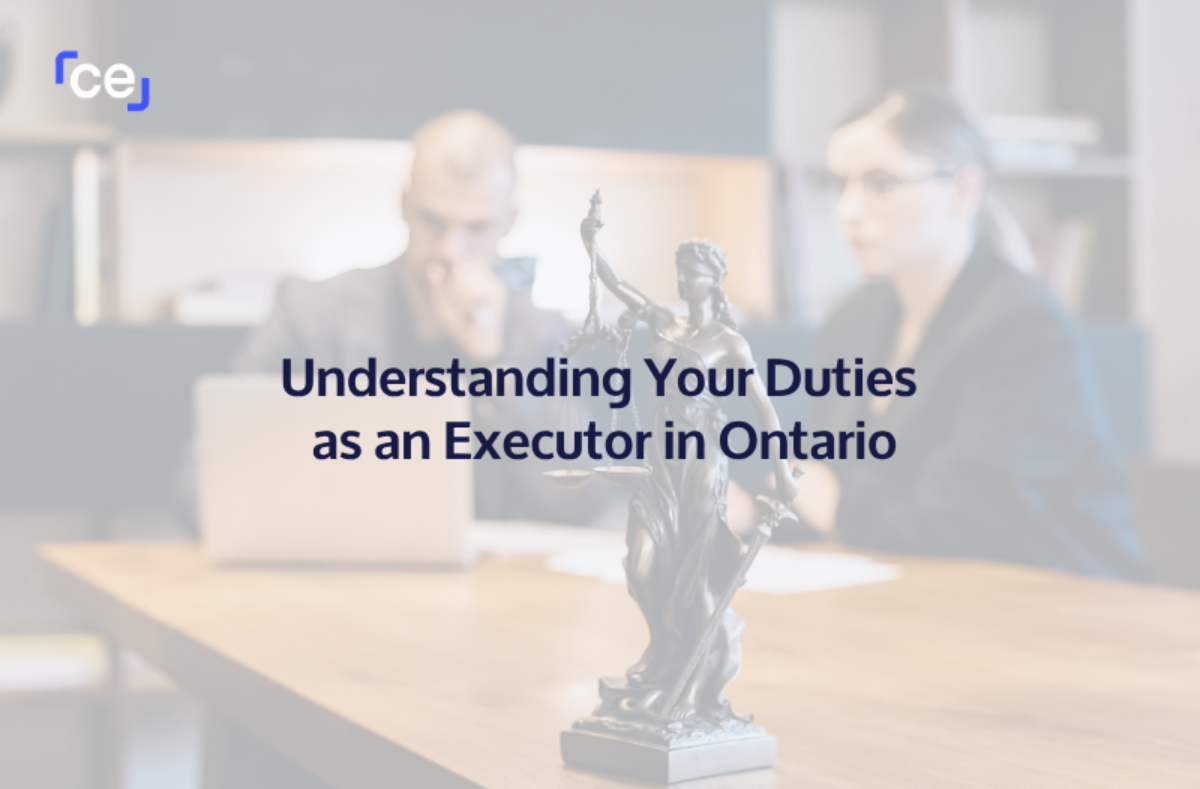Estate Settlement
Dec 04, 2024
How Do Executors Mail Inheritance Checks?
Find out how inheritance checks are mailed, including security measures and what to do if there are delays in receiving them.
Executor duties in Ontario are complex. Our guide covers essential responsibilities and legal requirements. Read on to learn how to effectively manage an estate.


Being named as an executor of an estate in Ontario is both an honour and a significant responsibility. As an executor, also known as an estate trustee, you're entrusted with the crucial task of managing and settling the affairs of a deceased person, most often - one of your loved one.
This role comes with a myriad of duties that can seem overwhelming at first glance. In this comprehensive guide, we'll walk you through the key responsibilities you'll face as an estate executor in Ontario, helping you navigate this complex process with confidence.
Before diving into specific duties, it's important to understand what being an executor entails. As an executor in Ontario, you're legally responsible for administering the deceased's estate according to their will (if one exists) and provincial laws.
Your primary goal is to protect the estate assets, settle any debts and taxes, and distribute the remaining assets to beneficiaries. This role grants you legal authority to act on behalf of the estate, but it also comes with the responsibility to act in the best interests of the estate and its beneficiaries.
Your duties as an executor begin immediately after the death of the individual. In the days following the passing, you'll need to:
These initial steps are crucial in setting the stage for the estate administration process. It's important to act quickly but thoughtfully, as these early actions can have significant implications for the rest of the probate process.
One of your primary duties as an executor is to identify, gather, and protect all assets belonging to the estate. This process involves:
This step requires meticulous attention to detail and thorough record-keeping. You'll need to create a comprehensive inventory of all estate assets, including their values at the time of death. This inventory will be crucial for probate purposes and for the fair distribution of assets later in the process.
In many cases, you'll need to apply for probate in Ontario. Probate is the legal process that confirms the validity of the will and your authority as the executor. To apply for probate, you'll need to:
The probate process can be complex and time-consuming, especially for estates that are not considered simple estates. It's often advisable to seek the assistance of an estate lawyer to ensure all documents are properly prepared and submitted.
As an executor, you're responsible for managing the estate's finances. This includes:
Financial management is a critical aspect of your role. It's essential to keep detailed records of all financial transactions related to the estate, as you may need to provide an accounting to the beneficiaries or the court.
Clear and regular communication with beneficiaries is crucial. Your duties in this regard include:
Effective communication can help prevent misunderstandings and potential disputes among beneficiaries, making your job as executor smoother.
The final major duty of an executor is to distribute the estate's assets according to the terms of the will or, if there is no will, according to Ontario's intestacy laws. This process involves:
It's important to note that as an executor, you have a fiduciary duty to act in the best interests of the estate and its beneficiaries. This means managing the estate's assets prudently and distributing them fairly according to the will or law.
As an executor, you're entitled to claim a reasonable allowance for your time and effort in administering the estate. This compensation is typically calculated as a percentage of the estate's value, but it must be approved by the beneficiaries or the court. Keep in mind that this compensation is taxable income, so you should consult with a tax professional about the implications.
Given the complexity of estate administration in Ontario, it's often advisable to seek professional assistance. Estate lawyers, accountants, and professional estate administrators can provide valuable guidance, especially when dealing with complex estates or potential disputes among beneficiaries. While simple estates might be manageable on your own, more complex situations often benefit from professional expertise.
Being an executor in Ontario is a significant responsibility that requires careful attention to detail, strong organizational skills, and a thorough understanding of your legal obligations.
Remember, every estate is unique, and the specific duties you'll face as an executor may vary depending on the complexity of the estate and the instructions left in the will. By understanding these core responsibilities and approaching your role with diligence and care, you'll be well-equipped to navigate the probate process successfully.
If you find yourself overwhelmed or uncertain and need professional guidance - book a free consultation with our estate specialists who will help guide you with actionable next steps to take when it comes to settling your loved ones estate.
 Simplify Probate Today
Simplify Probate Today
Get expert guidance from our probate specialists who've helped 10,000+ families.
Book a free consultation today